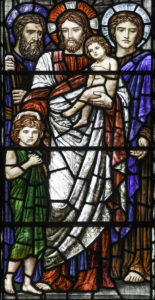What Does God Want? (Part III)
All hail the power of Jesus’s Name!
Let angels prostrate fall;
Bring forth the royal diadem,
And crown Him Lord of all!
– Edward Perronet (1726 – 1792), from “All Hail the Power of Jesus’s Name” (1779)
 For most of my life I saw Jesus as one of the founders of Christianity. The religion carries His name, right? And I have felt so betrayed by my childhood religion! Eventually, as I assembled all the ways in which the Christianity I love has been destructive, I also listed the ways in which Christianity has denied and betrayed the Lord’s teachings. But still, Jesus seemed to be partly complicit in what the religion had become. I had studied Christian history in college, so I knew that Christianity as we have it now had developed centuries after the Lord’s death. I understood the part that Roman Emperors had played in its creation. But to be frank, until recently I didn’t really know who Jesus actually was.
For most of my life I saw Jesus as one of the founders of Christianity. The religion carries His name, right? And I have felt so betrayed by my childhood religion! Eventually, as I assembled all the ways in which the Christianity I love has been destructive, I also listed the ways in which Christianity has denied and betrayed the Lord’s teachings. But still, Jesus seemed to be partly complicit in what the religion had become. I had studied Christian history in college, so I knew that Christianity as we have it now had developed centuries after the Lord’s death. I understood the part that Roman Emperors had played in its creation. But to be frank, until recently I didn’t really know who Jesus actually was.
Then in February of 2015 my beloved guide came out to me to persuade me to write Liberating Jesus. And during that conversation I asked him whether Jesus had been human or divine. My dear Thomas is not given to hyperbole, so he stunned me with his ardent answer.
Thomas said that Jesus came to us from the highest aspect of the Godhead. He told me that God actually lived in a human body in the Person of Jesus.
Thomas told me other things as well, including the urgency that surrounds our separating the historical Jesus from the dying religion that still bears His name. He pressured me into channeling the book. And I ended up channeling the Lord Himself.
 Christians have been calling Jesus the Son of God for millennia, without much considering what that means. For a Perfected Being to have lowered His Personal vibration sufficiently to descend from the highest aspect of the Godhead and enter a material body in order to live among us, develop insights about us, and patiently teach us how to better grow spiritually was an extraordinary act! And the fact that the fear-based religion that Constantine later founded and named for Jesus has little connection to the Lord’s Gospel message means only that it is long past time for us to separate His name from the religion that doesn’t follow Him so we can give Him a platform of His own.
Christians have been calling Jesus the Son of God for millennia, without much considering what that means. For a Perfected Being to have lowered His Personal vibration sufficiently to descend from the highest aspect of the Godhead and enter a material body in order to live among us, develop insights about us, and patiently teach us how to better grow spiritually was an extraordinary act! And the fact that the fear-based religion that Constantine later founded and named for Jesus has little connection to the Lord’s Gospel message means only that it is long past time for us to separate His name from the religion that doesn’t follow Him so we can give Him a platform of His own.
The teachings of Jesus are all about the will of the genuine, eternal Godhead. Thomas tells us that those teachings as Jesus shared them two thousand years ago were spoken by the Godhead Itself; and furthermore, Jesus tells us that God is speaking through Him. He says, “the words that I have spoken to you are Spirit and are Life” (JN 6:63). And He says, “I do nothing on My own initiative, but I speak these things as the Father taught Me” (JN 8:28). So it is indeed possible for us to learn directly from the Source what God wants!
Ours is the first generation that even can ask what God wants and find factual answers. Thanks to the specific intent of the Godhead that manifests our reality, the veil that has for so long been an impenetrable barrier between this material illusion and the rest of reality is being thinned enough for communication to become at least somewhat easier. And those who had agreed to enter lifetimes on earth and facilitate communication from this side are already here and are doing that now. It is no longer necessary to have faith in anything! For the first time in human history, now it is possible to Know.
 So Jesus came to us as our Emissary from the Godhead. And what did He tell us that God wants? When we boil it down, there are just four things that Jesus taught about the Will of God that are big departures from the human-made commands of all the numberless imaginary gods that people have worshiped over ten thousand years:
So Jesus came to us as our Emissary from the Godhead. And what did He tell us that God wants? When we boil it down, there are just four things that Jesus taught about the Will of God that are big departures from the human-made commands of all the numberless imaginary gods that people have worshiped over ten thousand years:
FIRST. Loving and forgiving are God’s only laws . The most important statement in all four Gospels arguably comes when Jesus answers a question about what is the greatest commandment. He doesn’t name any of the Ten Commandments. Instead He says, “‘You shall love the Lord your God with all your heart, and with all your soul, and with all your mind.’ This is the great and foremost commandment. The second is like it, ‘You shall love your neighbor as yourself.’ On these two commandments depend the whole Law and the Prophets” (MT 22:37-40). So should we then throw away the Law and the Prophets and replace all the old laws with just these two? Sure looks like it! And in the Old Testament, when someone breaks a law it is said that person is committing a sin and we see God decreeing a punishment. But even the concept of “sin” seems to be human-made. Jesus does sometimes use the word “sin,” but in a light, vernacular sense, as when He says to the woman taken in adultery, “Did no one condemn you?” She says, “No one, Lord.” He says, “I do not condemn you, either. Go. From now on sin no more” (JN 8:10-11). He doesn’t seem to see any “sin” as punishable. Rather than prescribing the stoning and mayhem that were the Old Testament’s divinely-decreed wages of sin, He says, “Do not judge, and you will not be judged; and do not condemn, and you will not be condemned; pardon, and you will be pardoned” (LK 6:37). Repeatedly Jesus emphasizes God’s command that we love and forgive, saying things like, “A new commandment I give to you, that you love one another, even as I have loved you, that you also love one another” (JN 13:34). And when Peter asks Him how many times we must forgive the same wrong, “Up to seven times?” Jesus says to him, “I do not say to you, up to seven times, but up to seventy times seven” (MT 18:21-23).
SECOND. Strictly Following the Teachings of Jesus Will Transform Our Minds .
 It is only very recently that we have come to understand that consciousness is the base creative force, and all our minds are inextricably part of one vast, eternal Mind. Jesus emphasizes three big consequences of that fact: (1) Our minds are extremely powerful. He says, “if you have faith the size of a mustard seed, you will say to this mountain, ‘Move from here to there,’ and it will move; and nothing will be impossible to you” (MT 17:20). Also, (2) The transformation we are to seek is internal. He says, “The kingdom of God is not coming with signs to be observed; nor will they say, ‘Look, here it is!’ or, ‘There it is!’ For behold, the kingdom of God is within you” (LK 17:20-21). And finally, (3) God wants us to relate to the Godhead individually and personally. He says, when you pray, go into your inner room, close your door and pray to your Father who is in secret, and your Father who sees what is done in secret will reward you” (MT 6:6).
It is only very recently that we have come to understand that consciousness is the base creative force, and all our minds are inextricably part of one vast, eternal Mind. Jesus emphasizes three big consequences of that fact: (1) Our minds are extremely powerful. He says, “if you have faith the size of a mustard seed, you will say to this mountain, ‘Move from here to there,’ and it will move; and nothing will be impossible to you” (MT 17:20). Also, (2) The transformation we are to seek is internal. He says, “The kingdom of God is not coming with signs to be observed; nor will they say, ‘Look, here it is!’ or, ‘There it is!’ For behold, the kingdom of God is within you” (LK 17:20-21). And finally, (3) God wants us to relate to the Godhead individually and personally. He says, when you pray, go into your inner room, close your door and pray to your Father who is in secret, and your Father who sees what is done in secret will reward you” (MT 6:6).THIRD. The teachings of Jesus must not be incorporated into any religion . Jesus says, “Nor do people put new wine into old wineskins; otherwise the wineskins burst, and the wine pours out and the wineskins are ruined; but they put new wine into fresh wineskins, and both are preserved” (MT 9:16-17). His teachings are the new wine. They are not compatible with any religion, and they must not be combined with one. Instead, He urges the clergymen who want to follow Him to share His teachings separately from all their religious work. He says, “Therefore every scribe who has become a disciple of the kingdom of heaven is like a head of a household, who brings out of his treasure things new and old” (MT 13:52). And Jesus seems to despise religions! He says, “Why do you transgress the commandment of God for the sake of your tradition?… You hypocrites! Rightly did Isaiah prophesy of you: ‘This people honors me with their lips, but their hearts are far away from me. But in vain do they worship me, teaching as doctrines the precepts of men’” (MT 15:3-9).
FOURTH. We must continue to question and to learn. This is a very important teaching! Every religion is a fly in amber. Ideas that
 at first were new and exciting are soon immobilized by dogmas and rules, and they became unchangeable. But now Jesus says, “Ask, and it will be given to you; seek, and you will find; knock, and it will be opened to you. For everyone who asks receives, and he who seeks finds, and to him who knocks it will be opened” (MT 7:7-8). We must have no dogmas! And beyond God’s few genuine commands, we are not even to have rules. Instead, each generation will freshly ask and will receive from the Godhead Its own ever more profound truths. Our relationship with God will be forever new.
at first were new and exciting are soon immobilized by dogmas and rules, and they became unchangeable. But now Jesus says, “Ask, and it will be given to you; seek, and you will find; knock, and it will be opened to you. For everyone who asks receives, and he who seeks finds, and to him who knocks it will be opened” (MT 7:7-8). We must have no dogmas! And beyond God’s few genuine commands, we are not even to have rules. Instead, each generation will freshly ask and will receive from the Godhead Its own ever more profound truths. Our relationship with God will be forever new.So the genuine Godhead in the person of Jesus has assured us that God wants simply this:
Loving and Forgiving are God’s Only Laws
Strictly Following the Teachings of Jesus Will Transform Our Minds
The Teachings of Jesus Must Not be Incorporated Into Any Religion
We Must Continue to Question and to Learn
Even in the twenty-first century, what the Godhead actually wants feels radical! God wants us to embrace what we last week called the third wave of human understanding, which is the realm of consciousness, or Spirit. And furthermore, these  four directives from God are deeply intertwined. We will find that we cannot have just one or two, but for them to be effective we must embrace all four. What does that even mean? And how will it work? Let’s consider next week how we can at last begin to live the meaning and the message of Jesus. It is time to embrace the Lord’s Way….
four directives from God are deeply intertwined. We will find that we cannot have just one or two, but for them to be effective we must embrace all four. What does that even mean? And how will it work? Let’s consider next week how we can at last begin to live the meaning and the message of Jesus. It is time to embrace the Lord’s Way….
Let every kindred, every tribe,
On this terrestrial ball,
To Him all majesty ascribe,
And crown Him Lord of all!
– Edward Perronet (1726 – 1792), from “All Hail the Power of Jesus’s Name” (1779)
Crowned virgin and child photo credit: giveawayboy Blessed Virgin with Christ Child via photopin (license)
Jesus with children stained glass photo credit: Lawrence OP The Lord will never forget you via photopin (license)
Broken organ photo credit: Thomas James Caldwell King of Instruments via photopin (license)
The post What Does God Want? (Part III) appeared first on Roberta Grimes.



